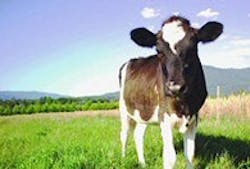New Regulations Mandate Dairy Waste Report, Fees
After three years of waiting in regulatory limbo, dairy producers in the Central Valley are now being asked to assess their waste handling and land application practices to ensure they are protecting surface and groundwater quality.
On Aug. 8, the Central Valley Regional Water Quality Control Board sent letters to all dairy owners and operators in the Sacramento and San Joaquin valleys requesting a mandatory report of waste discharge to be submitted by Oct. 17. An annual permit fee ranging from $327 to $4,360--depending on the size of the dairy--must be submitted with the report. As an incentive, facilities certified under the California Dairy Quality Assurance Program pay only 50 percent of the fee.
The waste discharge report is the first requirement for dairy producers to comply with new federal and state regulations for protecting water quality, said Paul Martin, environmental resources director for Western United Dairymen.
"It's not something that dropped out of the blue," said Martin. "It's the kickoff. Then the other stages will come. The trade associations, the (University of California) Cooperative Extension and the California Dairy Quality Assurance Program will all be involved in discussing how this is going to go forward, as will other stakeholders."
Prior to 2003, most producers were covered under a conditional waiver of waste discharge requirements and were not required to submit annual reports to the regional board. Later, producers were told of their obligation to comply with water quality rules, but they weren't required to submit any information unless it was requested by the board.
"Basically what it's going to boil down to is an assessment of facilities, nutrient balancing, waste management plan and emergency management plan," said Martin. "Producers are going to be asked to develop this kind of information. The monitoring programs and reporting programs will be developed as we go."
Some 1,700 dairies from the Oregon border to Kern County will be affected by the water quality rule. The CDQA Program plans to hold a series of workshops to assist producers in completing the waste discharge report and walk them through the various steps in the regulatory process, said Deanne Meyer, livestock waste management specialist from UC Davis.
"What we really want to do is provide them with some information and say, 'Here's the future; here's the kind of information you're going to need to collect; and here's what's going to happen with that information,'" said Meyer.
Representatives of the CDQA Program will notify producers when these meetings are scheduled. Meyer advised producers to watch for announcements in their milk checks and trade association updates.
Although the procedural details are still sketchy, Meyer said one thing is sure: All dairies that handle manure, whether they are owned or leased, will be required to do more record keeping and monitoring. This means producers will need to sample their solid and liquid wastes before they apply them to crops, track where the nutrients go and how much is removed from the growing crop. They also will need to calculate their existing storage capacity and determine how much is needed, based on their parlor activities and rain runoff.
For many dairy producers, these practices are a whole new process because they've never been asked to do them before, Meyer said. Furthermore, the information they submit to the regional board will eventually become public record.
"Does the average producer understand the magnitude of what this is going to do to them? No," she said. "Unless their facility was built in the last 10 years, this idea of submitting a report of waste discharge is new to them. They need to understand what their obligations are. They need to be able to assess their facility and figure out where they stand. They need to be able to have some comfort zone, or lack thereof, as to whether they're going to be a prime target for a lawsuit over groundwater contamination or potential groundwater contamination."
These issues will become more apparent as producers attend the workshops, she added.
"But to be able to do the class, we need to know where the water board stands, and we don't know that yet," she said.
In the meantime, producers should plan to attend the workshops and make sure they submit their waste discharge report with the appropriate annual fee to the regional board by Oct. 17, Meyer said.
Martin also encouraged producers to become certified under the CDQA Program, to reduce the amount of annual fee they will need to pay. Currently, only about 250 California dairies are certified, he said.
Source: California Farm Bureau Federation
